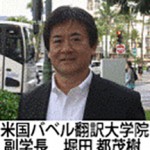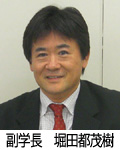「エクサスケールの衝撃―次世代スーパーコンピュータが壮大な新世界の扉を開く」、これは斎藤元章氏の著書のタイトル(PHP研究所刊)です。斎藤さんは2015年、世界スパ ここでの話は600ページ弱にも及ぶ本の目次をお見せするとその概要がつかめると思い しかし、私がここでこの話題を取り上げたのは、日本の、いや世界のトップのスーパーコンピューティングの技術者が最終章で取り上げている内容なのです。 序章 人類の未来を変える可能性を秘めた半導体 目次でもお分かりのように、エネルギーがフリーになり、食べ物が豊富に手に入り、働く 斎藤氏は彼の豊富な海外生活の中での経験談として、米国サンフランシスコ在住のある 「日本語の響きは、自分たちの知るかぎりの数十もの言語の中でも、最も美しく、特段穏やかで、平和的で、何を話しているかは理解できないのだけれど、まるで静かに感情を抑えながら、軽やかに歌っているようだ」、 「最初は、他の言語に比べて、母音がとても多いのがその一因だとも考えたものだ。でも、それだけが理由でないことはすぐわかった」、 「特に欧州の言語は、日本語に比べると、せわしなく、時にうるさく、感情がそのまま乗り移っていて、心が休まらない場合が多いのだが、日本語の美しい響きと流れるようにスムースな調べを聞いていると、心地よく、安静な精神状態を保つことができる。そこには、神々しささえ感じられる。世界のすべての言語が滅んでしまうことがあったとしても、あなたたちの国の言葉だけはのこってもらいたい」、 そこまで言うか、とは思いますが、言語学者、慶應義塾大学名誉教授の鈴木孝夫氏が言う こうした言語を持つ日本人を評して斎藤氏はこう言います、 「スーパーコンピュータの圧倒的な性能を正しい方向に使用するための道徳観念を持ち合わせていて、潤沢な成果をえたとしても平常心を維持できるのと同時に、利他の精神によって他国にそれらを無限に分け与えるだけの度量も有している我々日本人こそが、次世代スーパーコンピュータの積極的開発で世界を牽引するだろう。そしてその成果をまずは日本においてかたちにし、その次には、その恩恵を世界中のあらゆる国々に遍く行き渡らせることが必要であると考えています」と。 「加えて我々日本人には、欧米列強に追い込まれたうえでのやむにやまれぬ状況があったからだとしても、先の侵略戦争における諸外国への本当の意味での補償を完遂するという、重大な使命が残っている」、 「我が国のみならず、世界中の人々に平和と調和がもたらさし、そして世界全体が瑞穂の国となることを希求する国民性を、約2,700年という非常に長い期間をかけて醸成してきている。これらの要件のすべてが、新しい世界を創出するために求められているのだとすれば、そのすべてを備えた、おそらく唯一の国が、我々が生まれ育まれたこの国、日本であろう 」 そして彼はこう結んでいる。「我々日本人こそが次世代スーパーコンピュータを開発し、 *本の引用箇所は分かりやすさのため一部、前後の箇所からの言葉を加えてあります。 以上 海外からも参加できるオンライン説明会 ◆ 卒業生のキャリアカウンセリングを担当する副学長が、入学及び学習システムからカリキュラム、各種奨学金制度、修了生の活躍、修了後のフォローアップなどを総合的に説明いたします。 ◆ 海外在住の方にも参加いただけるように、インターネットweb会議システムのZoomを使って行います。 奮ってご参加ください。Zoomのやさしい使い方ガイドはこちらからお送りします。
Tomoki Hotta The Singular Impact of Exascale Computing on Us was recently pubished by Motoaki Saito, CEO of PEZY Computing K.K. and CEO of ExaScaler Inc. (PHP Institute, Inc.). In 2015, supercomputers created by Saito’s companies were ranked as the top three supercomputers by the Green 500, a list ranking the top 500 supercomputers in the world according to their energy efficiency. Saito also received the Japan Innovators Award in 2015 for his supercomputer research and technology. Below is the table of contents of this almost 600-page book. While only a simple outline, the table of contents provides an overall picture of the book’s content. What I want readers to focus on in particular is the final chapter, which covers Japanese and other top supercomputing engineers worldwide. Introduction: Semiconductors which possess the ability to change the future of mankind Chapter Two: Exascale computing will change everything Chapter Three: Energy free of charge Chapter Four: Emergence of a society with no need to work to survive Chapter Five: The day mankind stops aging Chapter Six: Say hello to a new value system Looking at the table of contents, the author clearly asserts that in the next 15 to 20 years a dream world is possible through supercomputer technology. Mankind is drawing ever closer to a world where energy is free, food is readily available, where societies have no need to work, and where people are free from illness and aging (one could argue whether this is a blessing or a curse). Saito draws from his extensive time overseas, citing the following observation of an elderly artist couple living in San Francisco. Although a bit taken aback by these words, I realized that what the couple was referring to is similar to what Tadashi Suzuki, professor emeritus of linguistics at Keio University, asserts. Suzuki uses the term “tatamizer effect” to explain how those who speak Japanese tend to become increasingly tranquil and magnanimous. Many overseas scholars of the Japanese language also agree with this theory. Saito makes the following comment about the Japanese, who are endowed with this poetic language. Saito concludes with the following statement. “The Japanese should therefore strive to develop the next-generation supercomputer, thus bringing about a new world.” *A few words have been added to the above quotes to make the content easier to understand.スーパーコンピューティングが壮大な新世界の扉を開く

コンランキング「Green 500」で世界の一位から三位を独占して、「日本イノベーター大賞」を受賞された方です。
ますので、やや安易かとも思いますが、以下に記します。
第1章 急速に近づく「前特異点(プレ・シンギュラリティ―・ポイント)」
第1項 我々は、歴史上、最も数奇なタイミングに生を受けている
第2項 レイ・カーツワイル氏が提唱する「特異点」と「6つの進化段階」
第3項 特異点到来の前に、「前特異点」が目前に迫っている
第2章 「エクサスケール・コンピューティング」によってすべてが変わる
第1項 ポスト「京」の開発が始動
第2項 すべての先進国が総力を挙げて開発を進める次世代スパコン
第3項 民間でも次世代スパコンを開発すべき理由
第3章 まずエネルギーがフリーになる
第1項 原発を止めつづけることは可能か
第2項 発電効率を大きく改善する技術
第3項 進む新エネルギーの研究開発
第4章 生活のために働く必要のない社会の出現
第1項 「衣」「食」「住」がフリーになる
第2項 「お金」から解放される
第3項 すべての個人が、あらゆる可能性を追求できる新しい社会
第5章 人類が「不老」を得る日
第1項 まったく新しい医療のかたち
第2項 肉体と技術は融合を開始する
第3項 奇蹟的なタイミングで生まれた女神
第6章 新しい価値観が生まれる
終章 我々日本人が次世代スーパーコンピュータを開発する
必要のない社会の出現、人類が病気から解放され、不老を得る日(これは逆に残酷?)も近いという、まるで夢物語のような世界が、スパコンにより、今より15年、20年というタイムスパンで可能になるということです。
芸術家の老夫婦のこんな会話を引用しています。
とまで言われたそうです。
タタミゼ効果、すなわち日本語を使うと人間が温和になる、包容力が増すというのは海外の日本語学習者の多くが同意していること、これは先ほどの話と相通じることなのかもしれません。
新世界を創出しなければならない」と。– 副学長から聞く - 翻訳専門職大学院で翻訳キャリアを創る方法

The Singular Impact of Exascale Computing on Us
Vice Chancellor
Babel University Professional School of Translation
Chapter One: Drawing closer with lightning speed to the pre-singularity point
Section One: We live in a most peculiar time in history
Section Two: The singularity and six epochs of technology evolution proposed by Ray Kurzweil
Section Three: Prior to the advent of singularity, a pre-singularity point is imminent
Section One: The beginning of post-metropolis development
Section Two: Developed countries cooperating to further development of the next-generation supercomputer
Section Three: Why the private sector should also develop the next-generation supercomputer
Section One: Is it possible to keep from using nuclear power plants?
Section Two: Technology that will vastly improve nuclear power plant efficiency
Section Three: Alternative energy research and development
Section One: Clothing, food, housing for free
Section Two: Released from the bondage of money
Section Three: A new society where all can pursue anything
Section One: A brand-new type of medical care
Section Two: When the physical body and technology integrate
Section Three: The miraculous timing of a goddess born
Conclusion: The Japanese will develop the next-generation supercomputer
[:]]]>
スーパーコンピューティングが壮大な新世界の扉を開く
Japanese has this certain ring that makes it the most beautiful, subtle, and gentle language out of the dozens of languages we know. Although we don’t understand the language, it always seems as though Japanese speakers are quietly checking their emotions as they seem almost to sing the language.
At first, we thought the reason for this beautiful sound was because Japanese contains more vowels than other languages. However, we soon realized that was not the only reason. European languages in particular are oftentimes hurried, sometimes even grating. Speakers clearly show their emotions through their words, causing listeners to feel almost at edge. When listening to the beautiful ring and smooth, almost flowing melody of Japanese however, one is able to maintain a calm, quiet state of mind. The language is almost divine in nature. Even if all other languages ceased to exist, we would hope that the Japanese language remain.
The Japanese – who possess the moral sense to steer use of the overwhelming capacity of supercomputers in the right direction – are able to maintain their presence of mind while obtaining outstanding results. They also – because of their altruistic mentality – have a generosity that enables them to share these results with other countries. This is why the Japanese should take the lead in proactively developing supercomputers. Japan should create results first domestically, then ensure the fruits of that technology are disseminated throughout the world.
In addition, the Japanese, which face their nation’s current condition due to the influence of major western powers, are entrusted with the great mission of rightfully compensating those countries affected by Japan’s acts of aggression during WWII.
Japan has fostered for over 2700 years a national character that longs for peace and harmony – not only for its people but also for those worldwide. Japan envisions a world of abundance and prosperity. It makes sense therefore that if these ideals are being sought after to create a new world, it should be our homeland Japan that takes the lead in making that vision a reality.




